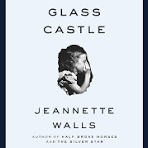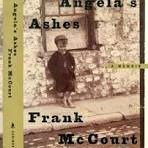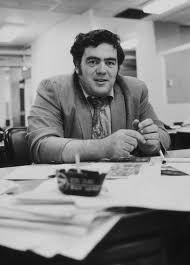High on the list of favorite books I’ve read is Angela’s Ashes, the 1999 Pulitzer Prize winner by Frank McCourt. Almost everyone I have exchanged opinions with found it depressing, a view I didn’t share. I laughed out loud at McCourt’s grim humor in his depiction of the miserable life of poverty that constituted his childhood.
Frank McCourt. Almost everyone I have exchanged opinions with found it depressing, a view I didn’t share. I laughed out loud at McCourt’s grim humor in his depiction of the miserable life of poverty that constituted his childhood.
Don’t get me wrong; I’m not a hard-hearted bastard. Two things: 1) McCourt’s treatment of the sordid conditions in Ireland, to which his alcoholic father moved the family from New York City during the height of the 1930s Great Depression, was frequently humorous, anything but self-pitying. 2) My own childhood, while not destitute like McCourt’s, was somewhat mirrored by the author’s.
So I readily immersed myself in The Glass Castle, the 2005 memoir by Jeannette Walls. It wasn’t a book that I discovered myself, but rather a recommendation by Jessica Dall, the editor of my manuscript Little Rag Doll: The Story of Wanda. Dall suggested only that I read excerpts, but I soon was immersed in it. Though I didn’t find this first-person memoir bore much resemblance to my work of narrative nonfiction, it was helpful in showing how emotion pulls the reader in. I was able to apply that principle in making revisions throughout my third-person narrative, fashioning numerous scenes that made events come alive.
a book that I discovered myself, but rather a recommendation by Jessica Dall, the editor of my manuscript Little Rag Doll: The Story of Wanda. Dall suggested only that I read excerpts, but I soon was immersed in it. Though I didn’t find this first-person memoir bore much resemblance to my work of narrative nonfiction, it was helpful in showing how emotion pulls the reader in. I was able to apply that principle in making revisions throughout my third-person narrative, fashioning numerous scenes that made events come alive.

Glass Castle was less humorous than McCourt’s memoir, and the writing style was different. McCourt’s dialogue was fast-paced, omitting commas and quotation marks, stringing phrases together with the conjunction “and.” I suspect it bore the influence of Jimmy Breslin, a fellow member of the New York coterie of writers around the 1990s. I like to think my dialogue is somewhat similar to McCourt’s in the duplication of speech: could o’ instead of could have, somethin’ for something, dontcha for don’t you, I hear ya instead of I hear you, etcetera. A reader of Blood on Their Hands, my latest novel, failed to understand that the fractured spellings were intentional, and amusingly wrote in a review, “The story is good but proofreading is very much needed.” (In my roman a clef Murder in Palm Beach, the dialogue won praise from noted New York agent Claudia Menza, who wrote, “You write well, and your dialogue is true to life, hard to do.”)


But I digress. Angela’s Ashes and the multiple-award-winning Glass Castle bore marked similarities. McCourt’s and Walls’ parents, or at least their fathers, were irresponsible alcoholics, leaving their children to fend for themselves amidst impoverishment. Rex Walls was brilliant, knowledgeable in mechanics, geology, engineering and physics, such that he continually conjured schemes for getting rich, including an innovative method to extract gold out of the mountains of the West. But that diversion rendered him negligent in seeking and holding jobs to produce income for his family’s welfare. He rebelled against authority, causing his firing from jobs. With no money to buy food, the children foraged through garbage throw-aways to stave off hunger.


Meanwhile, Rose Mary helped make ends meet only occasionally through public school teaching, lamenting that she needed to devote the time to pursue her art.
“Each memory is more incredible than the last,” the Plain Dealer of Cleveland wrote. “That Walls recounts them so well and in such detail is our good fortune.”
As for Angela’s Ashes, The Philadelphia Inquirer’s Peter Finn encapsulated the work in one sentence: “A spellbinding memoir that swerves flawlessly between aching sadness and desperate humor … a work of lasting beauty.”
The Walls family’s plight went from bad to worse when Rex moved them from the West to his mother’s home in Welch, West Virginia. She was a bitter, unpleasant
mother’s home in Welch, West Virginia. She was a bitter, unpleasant  and unwelcoming woman, and Rex found a shack on a hill, which was falling apart and without heat in the winter. The four children faced taunting from their school mates over the deplorable home the Walls children lived in and the shabby clothes they wore. Amid rock-throwing melees, the children teamed up to fight and send their tormentors packing.
and unwelcoming woman, and Rex found a shack on a hill, which was falling apart and without heat in the winter. The four children faced taunting from their school mates over the deplorable home the Walls children lived in and the shabby clothes they wore. Amid rock-throwing melees, the children teamed up to fight and send their tormentors packing.
All the while, Rex Walls devised plans to build a “glass castle” in the adjoining property, a dream that never was realized.
Lori, the oldest, saved money from odd jobs and decided to leave for New York after high school graduation. A talented artist, she was able to continue her education. Billy, Maureen and Jeannette followed. Jeanette got a writing job to work her way through Barnard College. A few years later, their parents moved to New York, surviving initially as homeless people on the streets, and eventually moving into an abandoned building.

Rex and Rose Mary visited Jeannette, and Rex dropped a wad of bills from a paper bag. He’d won it playing poker, and insisted she keep it. She was able to pay off her debt to Barnard. Later, Jeannette offered to help her parents financially, telling her mother that the magazine job left her living comfortably. Rose Mary responded that she was worried about her daughter, who asked why.
“Look at the way you live,” the mother replied. “You’ve sold out. Next thing I know, you’ll become a Republican. Where are the values I raised you with?”
The author penned other acclaimed books, as did her husband, John Taylor. Walls formerly was a regular contributor to MSNBC.
